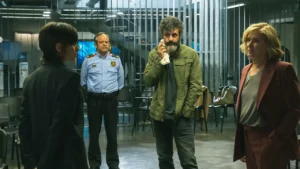Episode 8 of Twilight of the Gods, “Song of Sigrid”, is one of only two episodes directed by the show’s creator Zack Snyder — and you can’t half tell. As if the big operatic action spectacle wasn’t enough of a clue, an unexpected Jesus Christ cameo seals it. It’s a bizarre flourish to the ending of a show that has kept itself relatively contained to Norse mythology, something a filmmaker like Snyder would include because he thinks it gives new resonance to a very old story when in reality, it’s hard to see how it adds anything at all.
That very old story, it seems, is the tale of Ragnarok, the prophecized end of the Norse gods in which the world itself is destroyed and reborn anew. These initial eight episodes haven’t made the biggest deal of the concept beyond acknowledging that Loki’s underlying motivation is to avert its events and thus save his children, but the clues are there if you’re looking for them, as we’ll see.
Let Battle Commence
The battle between Sigrid and her allies and the Aesir and theirs encompasses the entire finale. There’s a ton of fighting and several key character deaths which I’ll discuss with more specificity, but it’s important to note that this battle is raging all the time and everything else happens either within it or slightly apart from it.
It’s also important to note that everyone is present for the battle, despite Leif, Thyra, and Egill having been left behind in the penultimate episode (for more on all the preceding chapters, check out our complete Season 1 recap.) The only thing going on away from the carnage is the Seid-Kona’s confrontation with Odin, so we’ll deal with that first.
Odin Sees His Future
Aile snuck off in the previous episode to confront Odin directly in the hopes of averting Egill’s death. This was, however, expected — or at least hoped for — by Odin, for reasons that will become clear.
Odin is obsessed with seeing his future. He’s obsessed with the manner of his demise. The obsession has driven him mad — why else would someone remove one of their own eyes, or hang themselves from Yggdrasil, the World Tree? Even the Aesir’s original conflict with the Vanir was initiated by Odin’s desire to steal their Seidr magic and gift of foresight; that’s why he took Freya as his bride.
Odin reveals to Aile, though, that Freya’s gifts were useless to him since she had already passed them to humanity. The gift had been passed down through each Seid-Kona, so Odin needs Aile to show him the future. And she does, though the gift comes at the cost of Odin’s memory. If he insists on looking forward, he will no longer be able to look back.
Odin sees flashes of what seem like several potential fates; Thor being impaled by Sigrid’s spear. Antler; Thor striking Jormungandr. But the thrust of the visions remains the same. Odin falls from favor. His totems are burned and people move on to other Gods. He imagines himself hanging from the World Tree, staring at Jesus Christ on the cross. He sees a modernity dominated by Christianity. This is the most horrifying fate he could imagine.
Aesir and Vanir United
Odin is so angry that he grabs Aile and disembowels her on the spot. Egill, who had used blood magic to locate her and fought his way up the tower to Odin’s throne room, arrives just as she expires.
But while Aile disappears, a new Seid-Kona takes her place. This one has some knowledge of Egill but does not recognize or love him as Aile did. Nevertheless, they leave together. As they do so, Freya appears and explains that this reincarnation of the Seid-Kona represents a union between the Aesir and the Vanir, since she is possessed of both Freya’s foresight and Odin’s memory.
The significance of this isn’t fully explained, but Egill clutches the Seid-Kona’s hand, determined to stay by her side.

Stuart Martin as Leif in Twilight of the Gods. Cr. COURTESY OF NETFLIX © 2024
Thor Kills Half the Cast
Thor claims many lives in the finale, starting with King Tiwaz, whom he brutally smashes up with his hammer. The second victim is Ulfr, who had earlier transformed into a wolf and summoned an army of his kind to fight in the battle.
But the third and most impactful is Hervor, who sacrifices herself to save Sigrid. In one of the season’s most emotionally powerful scenes, Sigrid begs the Valkyries to take her to Valhalla so she can be reunited with her sons, but none of them listen. Eventually, hands break through the ground to drag her to Hel, and Hel herself appears.
However, this isn’t as terrible a fate as it seems. Earlier, the einherjar had arrived in the battle — the souls of the battle-slain returned from Valhalla to do Odin’s bidding. Hel explains that Valhalla is not some promised reward, but essentially a recruitment drive for Odin’s private army. In Hel, Hervor will be spared this fate, and she will finally be free from the Gods.
Baldr’s Death Signifies the Beginning of Ragnarok
At Baldr’s urging — who is himself acting on the behest of Thor’s wife, Sif — Thor offers Sigrid the chance to surrender. The fighting can end, and no more blood needs to be shed.
Sigrid, of course, turns the offer down. She gives a Gladiator-style speech and engages Thor once again. When, during the ruckus, Thor is about to kill Leif, Sigrid throws Antler in his direction. However, the spear impales Baldr, not Thor. The death of Baldr is considered to be one of the precipitating events of Ragnarok, the apocalyptic event that wipes out the Norse gods and the world with it.
Freya arrives and transports a grieving Thor to Valhalla, denying Sigrid her vengeance. When she turns to Loki, he stabs her, knowing that killing her on the battlefield will send her to Valhalla, where she can continue to pursue Thor.
Twilight of the Gods ends with Sigrid waking up in Valhalla’s halls, along with Thor, who tells her that the song of Sigrid — the episode’s title — has begun.
More on Twilight of the Gods:




